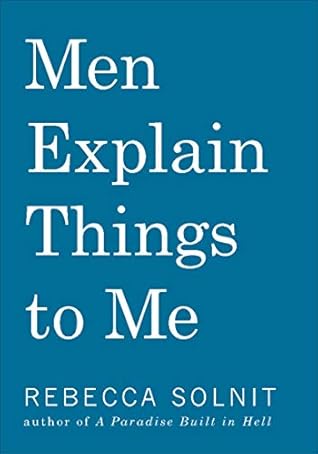More on this book
Community
Kindle Notes & Highlights
Men explain things to me, and other women, whether or not they know what they’re talking about. Some men. Every woman knows what I’m talking about. It’s the presumption that makes it hard, at times, for any woman in any field; that keeps women from speaking up and from being heard when they dare; that crushes young women into silence by indicating, the way harassment on the street does, that this is not their world. It trains us in self-doubt and self-limitation just as it exercises men’s unsupported overconfidence.
Brea Duymich liked this
Violence is one way to silence people, to deny their voice and their credibility, to assert your right to control over their right to exist.
Brea Duymich liked this
billions of women must be out there on this seven-billion-person planet being told that they are not reliable witnesses to their own lives, that the truth is not their property, now or ever.
Brea Duymich liked this
Men explain things to me, still. And no man has ever apologized for explaining, wrongly, things that I know and they don’t. Not yet, but according to the actuarial tables, I may have another forty-something years to live, more or less, so it could happen. Though I’m not holding my breath.
Brea Duymich liked this
But explaining men still assume I am, in some sort of obscene impregnation metaphor, an empty vessel to be filled with their wisdom and knowledge.
Brea Duymich liked this
The battle with Men Who Explain Things has trampled down many women—of my generation, of the up-and-coming generation we need so badly, here and in Pakistan and Bolivia and Java, not to speak of the countless women who came before me and were not allowed into the laboratory, or the library, or the conversation, or the revolution, or even the category called human.
Brea Duymich liked this
Most women fight wars on two fronts, one for whatever the putative topic is and one simply for the right to speak, to have ideas, to be acknowledged to be in possession of facts and truths, to have value, to be a human being.
Brea Duymich liked this
Young women, she said, needed to know that being belittled wasn’t the result of their own secret failings; it was the boring old gender wars, and it happened to most of us who were female at some point or other.
Brea Duymich liked this
Violence doesn’t have a race, a class, a religion, or a nationality, but it does have a gender.
Brea Duymich liked this
The pandemic of violence always gets explained as anything but gender, anything but what would seem to be the broadest explanatory pattern of all.
Brea Duymich liked this
It’s not that I want to pick on men. I just think that if we noticed that women are, on the whole, radically less violent, we might be able to theorize where violence comes from and what we can do about it a lot more productively.
Brea Duymich liked this
This should remind us that violence is first of all authoritarian. It begins with this premise: I have the right to control you.
Brea Duymich liked this
Murder is the extreme version of that authoritarianism, where the murderer asserts he has the right to decide whether you live or die, the ultimate means of controlling someone. This may be true even if you are obedient, because the desire to control comes out of a rage that obedience can’t assuage. Whatever fears, whatever sense of vulnerability may underlie such behavior, it also comes out of entitlement, the entitlement to inflict suffering and even death on other people. It breeds misery in the perpetrator and the victims.
Brea Duymich liked this
Think of how much more time and energy we would have to focus on other things that matter if we weren’t so busy surviving.
Brea Duymich liked this
Most people are afraid of the dark. Literally when it comes to children, while many adults fear, above all, the darkness that is the unknown, the unseeable, the obscure. And yet the night in which distinctions and definitions cannot be readily made is the same night in which love is made, in which things merge, change, become enchanted, aroused, impregnated, possessed, released, renewed.
Brea Duymich liked this
Despair is a form of certainty, certainty that the future will be a lot like the present or will decline from it; despair is a confident memory of the future, in Gonzalez’s resonant phrase. Optimism is similarly confident about what will happen. Both are grounds for not acting. Hope can be the knowledge that we don’t have that memory and that reality doesn’t necessarily match our plans; hope like creative ability can come from what the Romantic poet John Keats called Negative Capability.
Brea Duymich liked this
Not uncommonly, when a woman says something that impugns a man, particularly one at the heart of the status quo, especially if it has to do with sex, the response will question not just the facts of her assertion but her capacity to speak and her right to do so. Generations of women have been told they are delusional, confused, manipulative, malicious, conspiratorial, congenitally dishonest, often all at once.
Brea Duymich liked this


